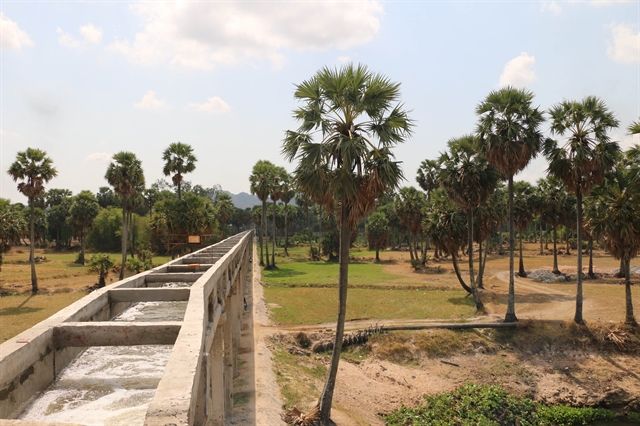 Environment
Environment

The Cửu Long (Mekong) Delta plans to grow this year’s winter – spring rice crop early since drought and saltwater intrusion are forecast to be severe in the dry season starting at the end of this year.

|
| Bọng Định Nghĩa pumping station supplies water to irrigate 1,400ha of rice in Tịnh Biên District’s An Phú Commune in the Cửu Long (Mekong) Delta province of An Giang. – VNA/VNS Photo Công Mạo |
HCM CITY The Cửu Long (Mekong) Delta plans to grow this year’s winter-spring rice crop early since drought and saltwater intrusion are forecast to be severe in the dry season starting at the end of this year.
The country’s rice granary is expected to sow 1.55 million hectares, down 50,000ha from the 2018-19 winter-spring crop.
Other crops will be grown on the 50,000ha as a proactive measure to mitigate the damage caused by saltwater intrusion.
The intrusion is expected to occur one or two months earlier than normal next year, according to the Southern Irrigation Science Institute.
Saltwater could reach 30-35 kilometres from the coast in December and 45-55 kilometres by January and February, it said.
Lê Thanh Tùng, deputy head of the Ministry of Agriculture and Rural Development’s Plant Cultivation Department, said the ministry had warned delta farmers about the drought and saltwater forecast and instructed them to grow the rice crop early.
Saltwater is expected to affect 100,000ha of rice fields, according to the ministry.
It advised rice farmers in higher areas to shift to other drought – resistant crops in winter-spring and rotate between rice and shrimp in low-lying areas.
The sowing of rice will start early this month.
Coastal provinces that face a high risk of drought at the end of the winter-spring crop like Bến Tre, Tiền Giang, Trà Vinh, Bạc Liêu, Sóc Trăng, and Kiên Giang will sow 400,000ha between October 10 and 30, 150,000ha more than in the same period last year.
In Kiên Giang, the country’s largest rice producer, the Department of Agriculture and Rural Development has announced growing schedules for major rice growing areas and warned farmers to scrupulously follow them to avoid the worst of the drought, saltwater intrusion and disease outbreaks.
Đỗ Minh Nhựt, deputy director of the department, said relevant agencies had been instructed to strictly enforce the schedules and instruct farmers to prepare quality rice seeds for sowing, flush salt from rice fields in coastal areas and join hands to create large-scale rice fields to guarantee outlets.
The department has encouraged farmers to grow three kinds of rice: high-quality varieties that meet export standards and both long-grain and short-grain high-yield varieties that are resistant to diseases.
The high-quality varieties for export are Jasmine 85, Đài Thơm 8, OM4900, and ST24.
These three groups will account for more than 85 per cent of the winter-spring rice grown.
The province plans to plant 289,000ha.
Trà Vinh Province has encouraged farmers to plant four varieties – OM 376, OM 9582, OM 429, and OM 9921 – that can withstand saltwater and are resistant to diseases.
Preparations
Many delta provinces have taken measures to cope with the expected drought and saltwater like storing freshwater for use in the dry season, building temporary dams and dredging irrigation works.
Nguyễn Hữu Lập, deputy chairman of the Bến Tre Province People’s Committee, said freshwater would be mobilised from various sources to prevent a shortage for household use and farming.
The committee has instructed relevant agencies to inspect irrigation works to repair degraded ones to prevent saltwater intrusion and store freshwater.
Sluice gates and irrigation canals will be dredged and temporary dams will be built to keep out saltwater.
It has put into use Kênh Lấp Reservoir in Ba Tri District to supply freshwater to more than 200,000 people living in coastal areas.
Nguyễn Thiện Pháp, head of the Tiền Giang Irrigation Sub-department, said the province had built 24 irrigation works in Gò Công Đông District to irrigate 2,500ha of rice and other crops in the upcoming dry season.
"If severe saltwater intrusion occurs, we will build 51 temporary dams in Gò Công Đông’s coastal communes to protect 4,398ha of crops," he said.
Tiền Giang plans to establish 195 pumping stations to irrigate rice in areas situated far away from canals. — VNS




